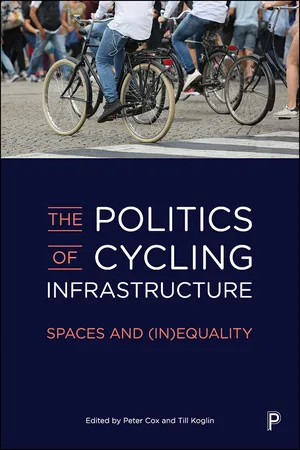
- 260 pages
- English
- ePUB (mobile friendly)
- Available on iOS & Android
eBook - ePub
About this book
This book offers a critical examination of existing cycling structures and the current policy and practices used to promote cycling. An international range of contributors provide an interdisciplinary analysis of the complex cultural politics of infrastructural provision and interrogate the pervasive bias against cyclists in city planning and transport systems across the globe.
Infrastructural planning is revealed to be an intensely political act and its meaning variable according to larger political processes and contexts. The book also considers questions surrounding safety and risk, urban space wars and sustainable futures, connecting this to broader questions about citizenship and justice in contemporary cities.
Frequently asked questions
Yes, you can cancel anytime from the Subscription tab in your account settings on the Perlego website. Your subscription will stay active until the end of your current billing period. Learn how to cancel your subscription.
No, books cannot be downloaded as external files, such as PDFs, for use outside of Perlego. However, you can download books within the Perlego app for offline reading on mobile or tablet. Learn more here.
Perlego offers two plans: Essential and Complete
- Essential is ideal for learners and professionals who enjoy exploring a wide range of subjects. Access the Essential Library with 800,000+ trusted titles and best-sellers across business, personal growth, and the humanities. Includes unlimited reading time and Standard Read Aloud voice.
- Complete: Perfect for advanced learners and researchers needing full, unrestricted access. Unlock 1.4M+ books across hundreds of subjects, including academic and specialized titles. The Complete Plan also includes advanced features like Premium Read Aloud and Research Assistant.
We are an online textbook subscription service, where you can get access to an entire online library for less than the price of a single book per month. With over 1 million books across 1000+ topics, we’ve got you covered! Learn more here.
Look out for the read-aloud symbol on your next book to see if you can listen to it. The read-aloud tool reads text aloud for you, highlighting the text as it is being read. You can pause it, speed it up and slow it down. Learn more here.
Yes! You can use the Perlego app on both iOS or Android devices to read anytime, anywhere — even offline. Perfect for commutes or when you’re on the go.
Please note we cannot support devices running on iOS 13 and Android 7 or earlier. Learn more about using the app.
Please note we cannot support devices running on iOS 13 and Android 7 or earlier. Learn more about using the app.
Yes, you can access The Politics of Cycling Infrastructure by Cox, Peter,Koglin, Till,Peter Cox,Till Koglin in PDF and/or ePUB format, as well as other popular books in Technologie et ingénierie & Urbanisme et développement urbain. We have over one million books available in our catalogue for you to explore.
Information
Table of contents
- Cover
- Title Page
- Copyright Page
- Contents
- List of figures, tables and box
- Notes on contributors
- Introduction
- 1. Theorising infrastructure: a politics of spaces and edges
- 2. The cultural politics of infrastructure: the case of Louis Botha Avenue in Johannesburg, South Africa
- 3. Spatial dimensions of the marginalisation of cycling – marginalisation through rationalisation?
- 4. Mental barriers in planning for cycling
- 5. Safety, risk and road traffic danger: towards a transformational approach to the dominant ideology
- 6. What constructs a cycle city? A comparison of policy narratives in Newcastle and Bremen
- 7. Hard work in paradise. The contested making of Amsterdam as a cycling city
- 8. Conflictual politics of sustainability: cycling organisations and the Øresund crossing
- 9. Vélomobility in Copenhagen – a perfect world?
- 10. Navigating cycling infrastructure in Sofia, Bulgaria
- 11. Cycling advocacy in São Paulo: influence and effects in politics
- Conclusion. politicising infrastructure or sustainable mobility?